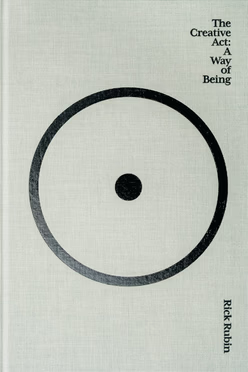The Creative Act
A Way of Being

Rick Rubin, the famed music producer of such disparate acts as the Beastie Boys, Slayer, Tom Petty, and Johnny Cash, proffers a meditation on creativity.
Rubin offers insight gained through his years helping creatives realize their visions. Consider this passage:
A point of view is different from having a point.
A point is an idea intentionally expressed. A point of view is the perspective—conscious and unconscious—through which the work emerges.
Insightful, but it would have resonated stronger backed by a real-world example. While I respect his decision to eschew the tell-all autobiography, limiting himself to the abstract diminishes his impact.
Consider how he talks of creatives leaning toward one of two categories:
Experimenters are partial to dreaming and play, finding it more difficult to complete and release their work.
Finishers are the mirror image, a backward reflection. They move quickly to the end point with immediate clarity. They are less interested in exploring the possibilities and alternatives that the Experimentation and Craft phases can suggest.
This resonated as I lean hard to the Experimenter side. I view Finishers with a kind of awe, but Rubin illustrates how Finishers suffer in their own right, struggling to realize a work’s full potential versus executing the minimum and moving on to the next project. Again, real-world examples (shared with the artists’ permissions, of course) would have moved it beyond the abstract into the tangible.
At least his solutions prove more concrete. He offers practical tips for both Finishers and Experimenters, in additional to strategies for avoiding other creative pitfalls. To avoid “demo-itis”, a condition where an artist can’t move past their first draft, he suggests:
Unless actively working to make something better, avoid listening to it, reading it, playing it, looking at it, or showing it to friends. Work as far forward as you can while crafting and then step away, without repetitively consuming the unfinished work. By not accepting the work-in-progress as the standard version, we leave room for growth, change, and development to continue.
Great advice. But still his insistence on dealing in abstracts frustrates. Compare this to Stephen King’s On Writing, which also featured creative strategies, but tied them to King’s own works, including a memorable lesson detailing how he almost lost The Stand.
Still, Rubin offers an insight the prolific King couldn’t:
Hanging on to your work is like spending years writing the same entry in a diary. Moments and opportunities are lost. The next works are robbed of being brought to life.
As someone who struggles to publish these reviews, this resonated.
All told, it’s a short and pleasing listen thanks to Rubin’s almost Bob Ross-like baritone, Though Rubin falls short of the profound he avoids pretension. Well, almost, as he does include this anecdote:
When my appendix burst, the doctor who diagnosed it insisted that I go to the hospital immediately to have it removed. I was told there were no other options. I found myself in a nearby bookstore. Standing out on a table in the front was a new book by Dr. Andrew Weil. I picked it up and let it fall open. The first passage my eyes went to said: if a doctor wants to remove a part of your body, and they tell you it has no function, don’t believe this. The information I needed was made available to me in that moment. And I still have my appendix.
That digression aside, it proves a worthy listen for folks interested in the creative process. I might have found more enjoyment in a rollicking memoir, or even a technical deep-dive into the assorted production techniques he’s employed, with these creative digressions sprinkled throughout, but given the book’s short length, I don’t regret the investment.
Reading History
- 2023Oct22SunAudiobook (Read by Rick Rubin)